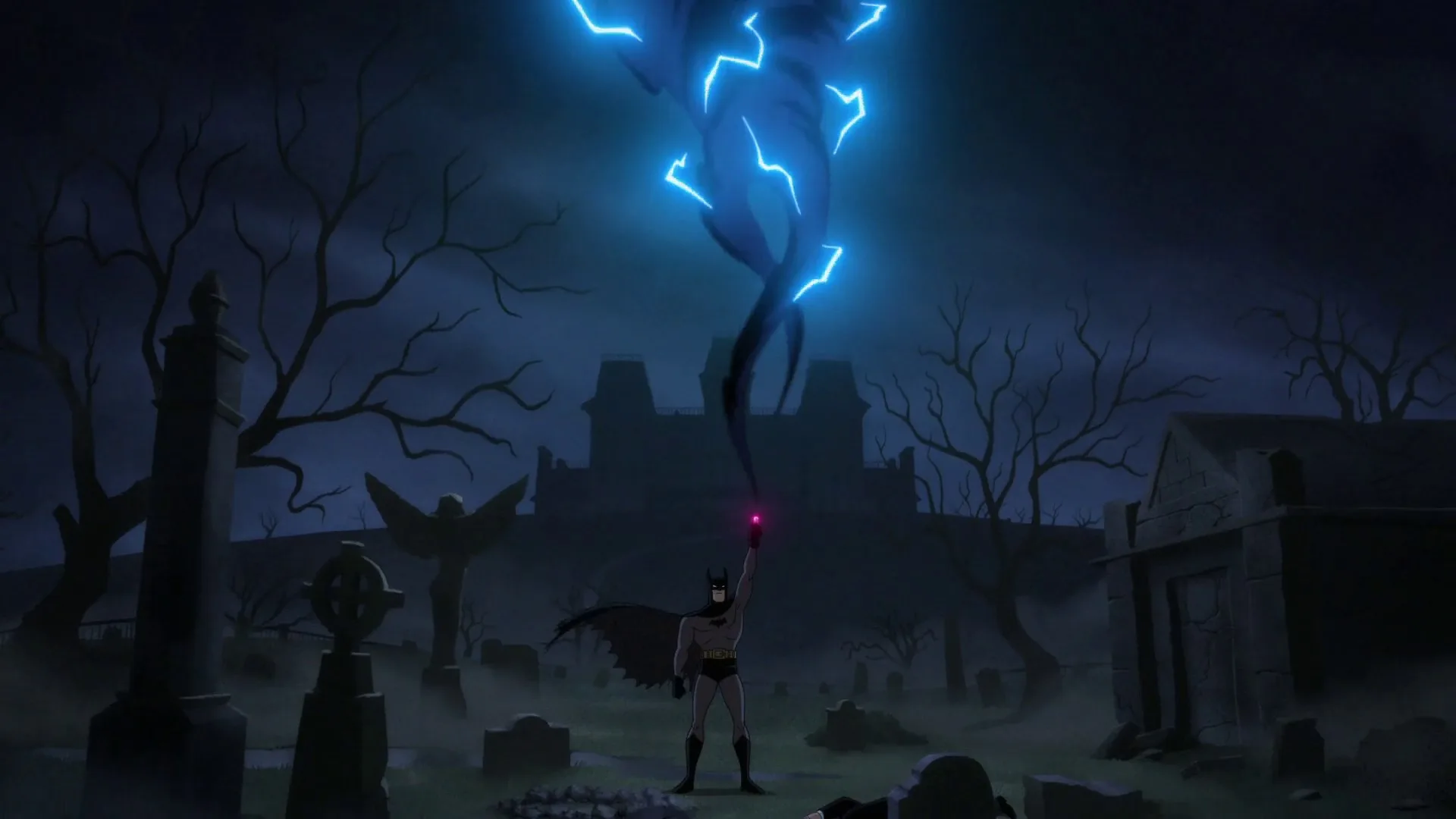In the middle of “Night Ride”, Batman: Caped Crusader‘s strange, atmospheric sixth episode, Batman pays a visit to Linton Midnite (a character familiar to fans of Hellblazer), who tells him “I appreciate a man willing to broaden his horizons.” It’s a perfect quote for an episode that feels like a turning point for Batman: Caped Crusader, both in terms of characters like Bruce and Harvey Dent , and for the series itself, as it begins to forge a path for a darker, slightly more mystical season to follow.
“Night Ride” introduces two characters from DC’s occult into Caped Crusader; Midnite and Gentlemen Ghost (who could be best described as an undead reverse Robin Hood, I guess?), two unexpected presences that set Batman: Caped Crusader into the world of the occult – not unfamiliar for the Dark Knight, but certainly unexpected amidst its more streamlined, noir-ish stories of the first five episodes (“…And Be a Villain” being the closest counterpart). Even Batman’s skeptical of the presence of ghosts early in the episode – especially after he finds out it’s a ghost on a horse stealing money from working-class people.

On its face, it is kind of a silly plot, and neglects to offer any sort of nuance into Gentlemen Ghost’s backstory; this version of Jim Craddock is just an 18th century racist, a ghost who robs people because of his lost fortune and chastises Batman about the tenants of racial equality. But its composition next to Harvey Dent’s slow descent actually works really well; as Dent, a nepo baby trying to change his reputation to win an election, is unable to escape the allure of riches himself, his loss of wealth based more in morality than his financial standing.
Dent’s decision to work with Thorne, who has slowly been working his influence in the background of Caped Crusader, is a clear sign of what’s to come in the final four episodes of the season. In “Night Ride” it works in concert with the stories around it, a confluence of events that leads Lucious, Batman, Alfred to Heritage Hill and into a conflict with Craddock. The fight scene itself isn’t that interesting, fitting the typical mold of Caped Crusader‘s slightly disappointing action sequences – but what follows are an intriguing series of scenes befitting of the episode’s reflections on moral corruption, and offers up a bit of evidence there’s still a human being under Bruce and Batman’s shared inhuman scowl.
During the climactic fight, Alfred becomes possessed by Craddock, and offers himself to be sacrificed in order for Batman to survive; Batman, incredulous, tells Alfred he would never let that happen – and later, notes that he “can’t do it without him” (whether he’s referring to his life as Batman or Bruce is unclear; what is clear, is how desperate Bruce is to save the only person who knows his true character). It’s a quiet moment amidst a much louder sequence, but it presents an important distinction between Bruce and Harvey; Alfred is a voice of reason, someone who has spent decades diffusing the anger and determination of an orphan son, and hasn’t let Bruce completely lose sight of his values (though his disinterest in whatever Midnite is up to with Craddock-in-a-vial is certainly interesting).

It’s a great moment, and pairs beautifully with the closing scene, where a lonely, isolated Harvey Dent fires his political advisor and decides to compromise his morals and work with Thorne (who is quietly consolidating powers on both sides of the law in Gotham, something I’m sure the strangely absent Detective Gordon might have some thoughts of). Privilege and money in Gotham are neat pathways to moral rot and corruption; though “Night Ride” could’ve spent a bit more time watching Dent wallow in his own impending failure, his willingness to make a deal with Gotham’s devil is an effective tool in establishing his desperation, setting up the inevitable, iconic fall into Two-Face I’m sure we all expect to have this season.
Though the inclusion of occult characters and ideas in “Night Ride” initially seems an awkward match for Batman: Caped Crusader‘s tone, it works surprisingly well in providing some much-needed texture to what’s been a fairly upright narrative so far. A little weirdness goes a long way in letting the series loosen up a bit and explore its own potential a bit; hopefully it is something it can find space to lean on a bit harder as it makes its turn towards building to the season’s climactic moments, because
Grade: B
Other thoughts/observations:
- For those unfamiliar, Gentlemen Ghost has been a part of the DC world for a long time, first appearing in The Flash series in the 1940s.
- Lucious pries Bruce on his discretionary account; Bruce waves it off as his “petty cash” fund. Must be nice!
- Yes, the logic around Gentlemen Ghost is ridiculous and extremely inconsistent (he can hit you with his bag or his fists, but Batman can’t punch him back?); I think it only makes it more fun, as a character who breaks down the conventions of Batman’s analytic approach.
- Speaking off, this episode is held back from being a really great episode from having a longer running time; with it, there would’ve been more space for Batman to bang his head against something that completely defies his logic. With a surprisingly busy story, there’s not a lot of room for that, but it definitely undercuts how much something like this would fuck with Batman initially.
- “The world’s big enough for us. Ghosts need not apply.”
- Bruce runs into a librarian named Wilma, who notes Bruce used to visit with his mother and read about knights and quests.
- Pennyworth briefly channels Hamlet when trying to convince Batman ghosts are real: “There are more things than heaven and earth, Horatio.”
Discover more from Processed Media
Subscribe to get the latest posts sent to your email.


